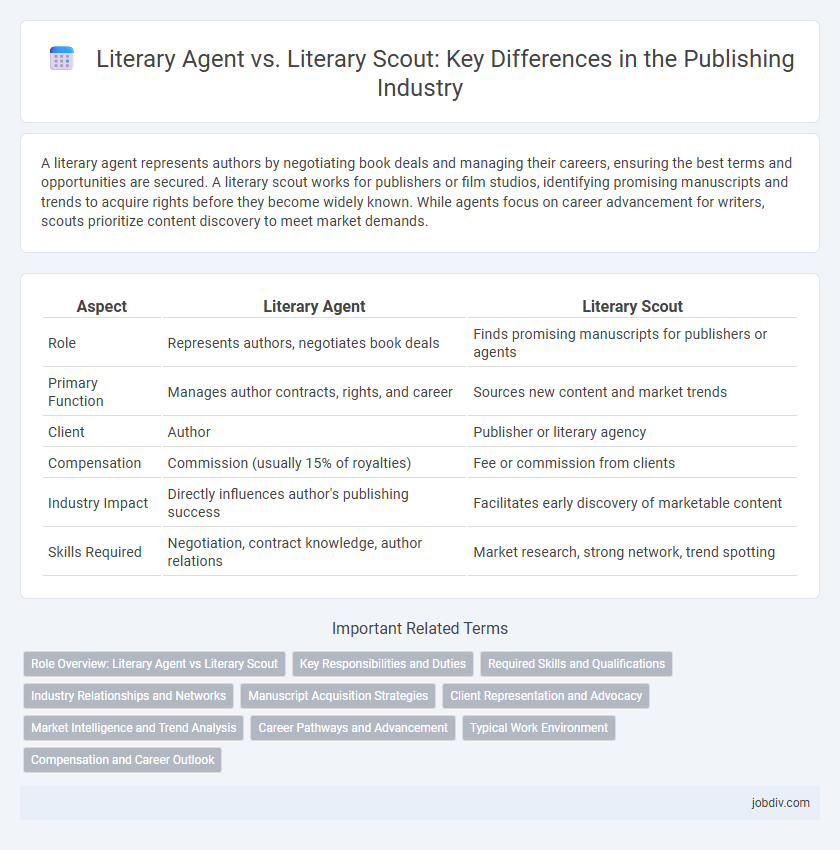A literary agent represents authors by negotiating book deals and managing their careers, ensuring the best terms and opportunities are secured. A literary scout works for publishers or film studios, identifying promising manuscripts and trends to acquire rights before they become widely known. While agents focus on career advancement for writers, scouts prioritize content discovery to meet market demands.
Table of Comparison
| Aspect | Literary Agent | Literary Scout |
|---|---|---|
| Role | Represents authors, negotiates book deals | Finds promising manuscripts for publishers or agents |
| Primary Function | Manages author contracts, rights, and career | Sources new content and market trends |
| Client | Author | Publisher or literary agency |
| Compensation | Commission (usually 15% of royalties) | Fee or commission from clients |
| Industry Impact | Directly influences author's publishing success | Facilitates early discovery of marketable content |
| Skills Required | Negotiation, contract knowledge, author relations | Market research, strong network, trend spotting |
Role Overview: Literary Agent vs Literary Scout
A literary agent represents authors, negotiating book deals and managing contracts to secure the best publishing opportunities and royalties. In contrast, a literary scout identifies promising manuscripts or authors for publishers or foreign agents, focusing on market trends and potential sales rather than direct contract negotiation. Both roles are crucial in the publishing pipeline, with agents prioritizing author advocacy and scouts emphasizing market insights.
Key Responsibilities and Duties
Literary agents primarily negotiate book deals, secure publishing contracts, and manage authors' careers to maximize royalty earnings and rights sales. Literary scouts specialize in identifying promising manuscripts and trends, then pitching them to publishers or foreign markets to acquire rights and expand market reach. Both roles require strong industry networks, but agents focus on long-term client management while scouts prioritize scouting new content opportunities.
Required Skills and Qualifications
Literary agents require strong negotiation skills, industry knowledge, and the ability to identify marketable manuscripts to secure publishing deals for authors. Literary scouts must possess keen market awareness, excellent networking abilities, and a deep understanding of global rights to discover and evaluate promising works for acquisition by publishers or agents. Both roles demand excellent communication, literary expertise, and the capacity to build relationships within the publishing industry.
Industry Relationships and Networks
Literary agents maintain extensive, long-term relationships with publishers, editors, and authors, positioning themselves as key negotiators for book deals and contract terms. Literary scouts leverage specialized industry networks to identify promising manuscripts and trends, often feeding opportunities directly to foreign publishers or niche markets. Both rely heavily on deep-rooted industry connections, but agents focus on career management while scouts emphasize market intelligence and discovery.
Manuscript Acquisition Strategies
Literary agents actively acquire manuscripts by building strong relationships with authors, attending writing conferences, and negotiating contracts to secure publishing deals. Literary scouts focus on identifying promising manuscripts for publishing houses or foreign publishers, leveraging industry insights to forecast market trends and potential bestseller hits. Both roles require strategic manuscript evaluation but differ in target clients and acquisition tactics within the publishing ecosystem.
Client Representation and Advocacy
Literary agents represent authors by securing book deals and negotiating contracts, advocating for their clients' financial and creative interests throughout the publishing process. Literary scouts identify promising manuscripts or authors and connect them with publishers or agents but typically do not manage ongoing client relationships or contract negotiations. Agents serve as primary advocates, while scouts act as talent finders and industry intermediaries without direct client representation.
Market Intelligence and Trend Analysis
Literary agents and literary scouts both play crucial roles in market intelligence and trend analysis within the publishing industry. Literary agents leverage their deep industry connections and knowledge to identify emerging author talent and negotiate lucrative publishing deals, while scouts focus on monitoring global market trends to discover promising manuscripts and intellectual properties before they gain widespread attention. Their combined expertise ensures publishers stay ahead of shifts in reader preferences and genre popularity, optimizing acquisitions and content strategies.
Career Pathways and Advancement
A literary agent typically advances by building a robust client list, negotiating book deals, and developing industry connections, often starting as assistants or interns before managing established authors. Literary scouts progress by identifying promising manuscripts for publishers or foreign markets, leveraging market trends and network insights, usually transitioning from editorial or rights departments. Career growth in both roles depends on deep industry knowledge, strong negotiation skills, and the ability to anticipate literary trends for successful book placements.
Typical Work Environment
Literary agents typically work in publishing houses or independent offices, collaborating closely with authors, editors, and marketing teams to secure book deals and manage contracts. Literary scouts often operate within larger publishing networks or agencies, frequently traveling to international book fairs and industry events to identify promising literary works for translation or acquisition. Both roles demand strong industry connections and frequent communication but differ in their primary environments--agents are more office-based, while scouts have a more dynamic, event-focused setting.
Compensation and Career Outlook
Literary agents typically earn a 15% commission on an author's book sales, making their income directly tied to successful deals, while literary scouts often receive fixed fees or retainers from publishers for identifying promising manuscripts, resulting in more stable but potentially lower earnings. Agents generally have long-term career prospects tied to building strong author portfolios and growing industry connections, whereas scouts may experience fluctuating demand based on publisher needs and manuscript trends. Career growth for agents often involves expanding client rosters and negotiating bigger advances, while scouts focus on honing market insight and networking with editors to increase their value.
Literary Agent vs Literary Scout Infographic

 jobdiv.com
jobdiv.com